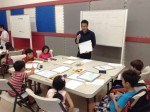The original version of this article contained information that was unclear and has been changed. See the bottom of the article for additional information.
Inside a modest gray building, tucked among pho restaurants and Vietnamese cafes in the heart of Reseda’s Vietnamese community, UCLA students write out vocabulary lessons on whiteboards for children whose parents have brought them to learn about their heritage.
Members of UCLA’s Vietnamese Language and Culture club teach about 30 students ages 5 to 16for four hours every Saturday morning at the Hung Vuong Vietnamese School less than 14 miles from UCLA.
“We want to make sure the bridge from one generation to the next is strong after we’re gone,” said John Pham, a fifth-year anthropology student and outgoing director for the Vietnamese Language and Culture club.
Upon arrival, the young students split into groups based on their language proficiency and learn how to read, write and speak Vietnamese.
The club, which is part of the Undergraduate Students Association Council Community Service Commission, started the tutorial program at Hung Vuong nearly 20 years ago.
Pham has been teaching classes at the center since his freshman year. He and other UCLA volunteers said their passion for teaching younger generations about their culture stems from their own experiences.
“Once culture is lost, it’s lost,” he said.
Pham said he struggled to assimilate to American society after emigrating from Vietnam to California with his family when he was 10 years old. He arrived with his younger brother and a single mother. None of them knew a single word of English.
“Your perspective changes when you come over here. The people are going to be different, you learn a different history, a different language,” Pham said. ”It’s overwhelming at first, but you adapt.”
Pham’s mother focused on looking for jobs in Orange County – an area with a workforce demanding English proficiency. He and his brother spent most of their time in English classes learning to adapt to the new, American culture.
He said his mother always saw to it that her sons held onto their heritage by strictly enforcing Vietnamese language and culture in their household.
“At school, it was about American education. But at home, it was Vietnamese education,” he said.
At Hung Vuong, Pham calmly demonstrated proper pronunciation for the students as they adjusted to the trickier sounds in Vietnamese. He used what he learned from his own bilingual and bicultural experience as he worked with the younger students.
Pham thinks assimilating into American culture is important, but he works with the students so that they do not lose their heritage, he added.
“Instead of being American, why not (be) a Vietnamese-American who can be proud of two cultures?” he said.
Christina Nguyen, a fourth-year biochemistry student and incoming director for the group, said she grew up celebrating Vietnamese holidays and traditions in California, but her access to Vietnamese culture was limited by her lack of proficiency in the language.
“Vietnamese is not my native language, and I feel regret that it isn’t,” she said. “It’s really sad to see and know that I can’t really be as close to my grandparents as I want to be because we simply can’t understand each other.”
Nguyen said her experiences growing up with Vietnamese culture are marked by intergenerational tensions between her parents’ cultural expectations and her own emerging consciousness as a Vietnamese-American.
To this day, Nguyen said she feels the pressure of her parents’ will upon her choices.
“Even now my dad is like ‘you should be a doctor. I’ll pay for your medical school,’” Nguyen said. “It’s just not what I want to do.”
Currently applying for pharmaceutical school, Nguyen sees this decision as a compromise between her parents’ expectations and her own vision for her life.
At Nguyen’s table on Saturday, the children learned how to count in Vietnamese. Some of the young students stared blankly into space instead of at the board, while others had their eyes glued to it, as they adjusted to the six accents in the Vietnamese language.
Oliver Park, 16, has been taking classes at Hung Vuong for the past two years.
Park said he found the classes “boring“ at first, but gradually began to recognize their value in his relationships with family members.
“I know very little, but for some reason, it really impresses (my family)” Park said. “It’s a great way to spend my weekend – I get something out of it.”
Park continues taking the classes because he said he values the difference they have made on his understanding of his history and heritage.
“My grandparents – they have a past and a history that’s going to be forgotten if it is not passed down,” Park said.
Clarification: The Vietnamese Language and Culture club is part of the Undergraduate Students Association Council Community Service Commission.

nice